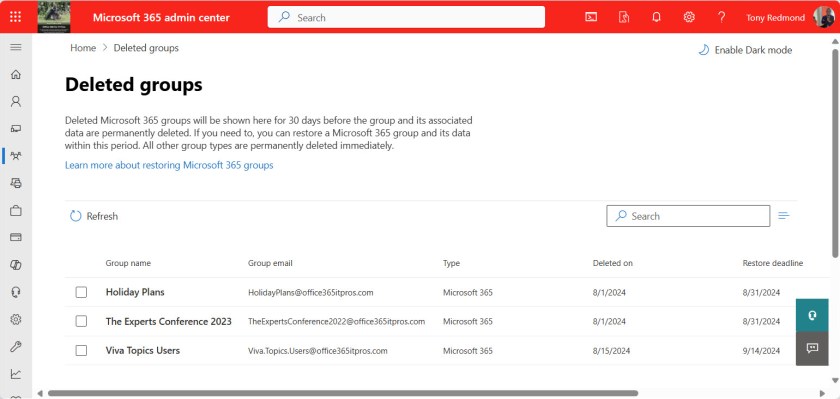Table of Contents
Ability to Restore Deleted Groups Depends on Graph APIs
Yesterday, I covered a gap that exists between the Purview development group and the Exchange Online development group when it comes to applying scoped roles to audit log searches. Today, a blog post by ex-MVP Tony Murray-Smith reminds me about another functionality gap that exists in the area of groups. The problem described occurred when a user deleted a security group by mistake only to discover that the Entra admin center doesn’t support a method to restore deleted groups of this type.
In fact, Microsoft 365 groups are the only type of group that Entra supports for restoration via its admin center. There’s no way to restore a deleted distribution list, dynamic distribution list, security group, or mail-enabled security group. Apart from dynamic distribution lists, these objects are recognized by Entra ID and accessible through the Groups API. However, the only group objects supported by the List Deleted Items and Restore Deleted Items (directory objects) APIs remain Microsoft 365 groups. And if a Graph API isn’t available to support restoration, the administrative portals cannot create functionality from thin air.
This situation has persisted since the introduction of cmdlets to restore deleted Microsoft 365 groups in 2017 followed by a GUI option in the Exchange admin center, Microsoft 365 admin center, and Entra admin center. Microsoft subsequently removed the option to restore deleted groups from the new EAC, so the current GUI-based options to restore deleted Microsoft 365 groups are in the Entra admin center and Microsoft 365 admin center. And if you want to use PowerShell, there’s the Restore-MgDirectoryDeletedItem cmdlet.

The Gap Between the Exchange DS and Entra ID
The question is why Entra ID only supports the restoration of Microsoft 365 groups. I think the answer lies in two parts. First, the desire within Microsoft to make its brand-new cloud-only Office 365 groups (now Microsoft 365 groups) the “best group for everything” following their launch at the Ignite conference in May 2015.
The infrastructure to fully support Microsoft 365 groups took time to develop, and building the capability to reconnect all the different resources that a group might use made the process more complicated for Microsoft 365 groups. Being able to restore SharePoint Online, Teams, the group mailbox, and so on was a big undertaking that Microsoft quickly discovered needed to be tackled after the launch of Office 365 groups, especially after some early customers discovered that they couldn’t be restored. The functionality duly arrived in 2017. The campaign to make Microsoft 365 groups do everything is far less intense now than it was some years ago, but its legacy is evident sometimes.
The EXODS Objects
The second issue is heritage. Distribution lists and mail-enabled security groups originated in Exchange Server. Exchange Online still has its own directory (EXODS) to store details for mail-enabled objects. Synchronization and dual-write update operations keep Entra ID and EXODS aligned so that updates performed in one directory synchronize immediately to the other. The Graph APIs support distribution lists and security groups, including mail-enabled security groups, but Entra ID and the Graph APIs ignore dynamic distribution lists and can’t update settings for distribution lists and mail-enabled security groups because these objects are homed within Exchange Online.
Good reasons exist for why the differentiation exists. Dynamic distribution lists require Exchange Online to resolve their membership because the membership supports objects like mail-enabled public folders that don’t exist in Entra ID. Dynamic distribution lists also support nested lists. Regular distribution lists and their mail-enabled security group variants have many settings that aren’t supported in Entra ID, like message approval.
As far as I can remember, it has never been possible to restore deleted distribution lists (and some of the online answers are very misleading, like this example). Once an administrator removes a distribution list, it’s gone. The only thing that can be done is to recreate the distribution list from scratch. That might be possible if someone knows the membership and the list settings, but that might not be the case.
Some Work Necessary in This Area
Microsoft should do some work to make it possible to restore all forms of deleted groups. That work will need contributions from teams responsible for Entra ID, the Graph API, and Exchange Online. Mistakes do happen and administrators remove important distribution lists or mail-enabled security groups when they shouldn’t. Being told that it’s necessary to recreate an object from scratch is a royal pain, and it’s something that shouldn’t still be a problem in 2024. Customers assume that if they can restore one type of deleted group, they should be able to restore any type of deleted group.
Then again, other pains exist around distribution list management, like the Microsoft’s failure to produce a utility to move distribution lists from on-premises servers to the cloud. Tim McMichael’s DLConversionV2 solution is the best available. He’ll be discussing distribution list management at TEC 2024 in Dallas in October. Maybe I should ask Tim about restoring groups that aren’t Microsoft 365 groups.
Learn about using Exchange Online and the rest of Office 365 by subscribing to the Office 365 for IT Pros eBook. Use our experience to understand what’s important and how best to protect your tenant.
I tried this some months ago. I wanted to make a hybrid SG into a cloud-native one. I deleted it in AD, and wanted to restore it in Entra. Did not work :(. However, you can do this for hybrid user accounts. I hope Microsoft soon publishes a feature which let’s us segregate hybrid groups with the push of a button 🙂